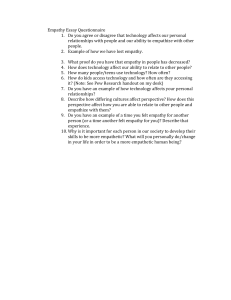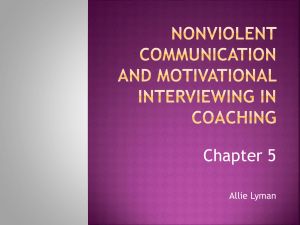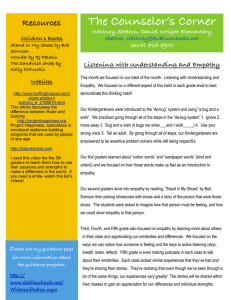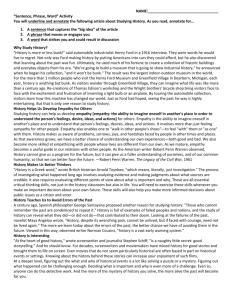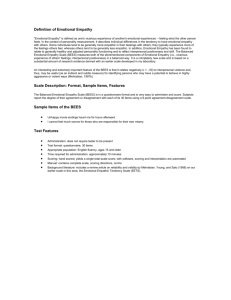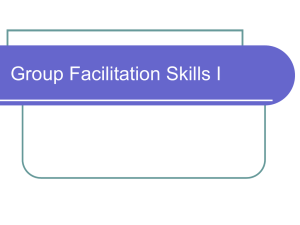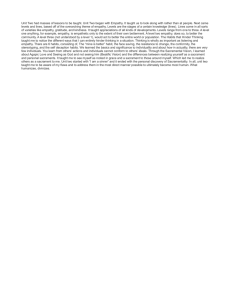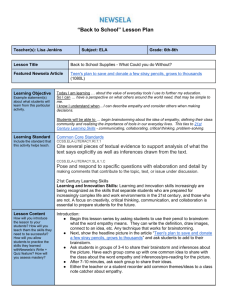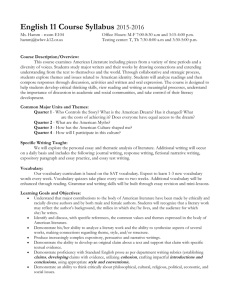English 9 Course Syllabus - West Linn
advertisement
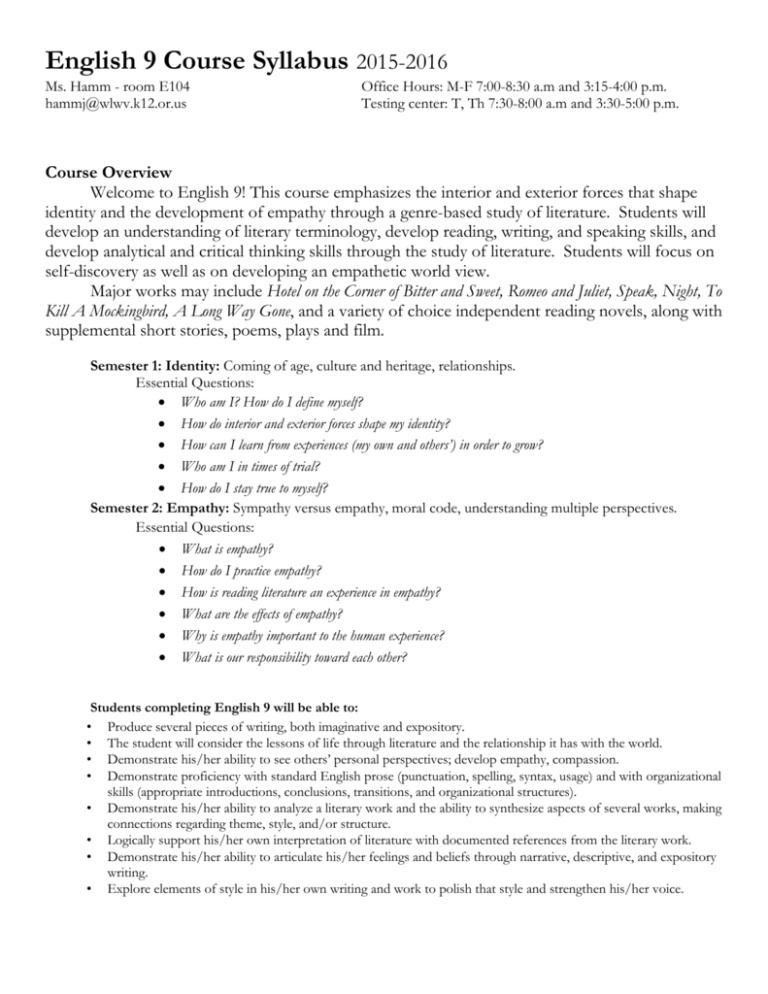
English 9 Course Syllabus 2015-2016 Ms. Hamm - room E104 hammj@wlwv.k12.or.us Office Hours: M-F 7:00-8:30 a.m and 3:15-4:00 p.m. Testing center: T, Th 7:30-8:00 a.m and 3:30-5:00 p.m. Course Overview Welcome to English 9! This course emphasizes the interior and exterior forces that shape identity and the development of empathy through a genre-based study of literature. Students will develop an understanding of literary terminology, develop reading, writing, and speaking skills, and develop analytical and critical thinking skills through the study of literature. Students will focus on self-discovery as well as on developing an empathetic world view. Major works may include Hotel on the Corner of Bitter and Sweet, Romeo and Juliet, Speak, Night, To Kill A Mockingbird, A Long Way Gone, and a variety of choice independent reading novels, along with supplemental short stories, poems, plays and film. Semester 1: Identity: Coming of age, culture and heritage, relationships. Essential Questions: Who am I? How do I define myself? How do interior and exterior forces shape my identity? How can I learn from experiences (my own and others’) in order to grow? Who am I in times of trial? How do I stay true to myself? Semester 2: Empathy: Sympathy versus empathy, moral code, understanding multiple perspectives. Essential Questions: What is empathy? How do I practice empathy? How is reading literature an experience in empathy? What are the effects of empathy? Why is empathy important to the human experience? What is our responsibility toward each other? Students completing English 9 will be able to: • Produce several pieces of writing, both imaginative and expository. • The student will consider the lessons of life through literature and the relationship it has with the world. • Demonstrate his/her ability to see others’ personal perspectives; develop empathy, compassion. • Demonstrate proficiency with standard English prose (punctuation, spelling, syntax, usage) and with organizational skills (appropriate introductions, conclusions, transitions, and organizational structures). • Demonstrate his/her ability to analyze a literary work and the ability to synthesize aspects of several works, making connections regarding theme, style, and/or structure. • Logically support his/her own interpretation of literature with documented references from the literary work. • Demonstrate his/her ability to articulate his/her feelings and beliefs through narrative, descriptive, and expository writing. • Explore elements of style in his/her own writing and work to polish that style and strengthen his/her voice. Grading policies/practices: While grades are limited in their scope, my goal is to have your grade accurately reflect your effort and growth in the class. Daily work and quizzes are worth 5-10 points. Longer tests and writings are usually worth 25-50 points. Major projects, essays, and tests are usually worth 75-100 points. Semesters average 850-1000 points. Grades are on the 10% scale (90-100% = A) You have access to the gradebook. Be sure to check it. Late Work: Daily work will not be accepted late unless you have an excused absence. It is your responsibility to find out what you missed and submit the assignment the next day. Projects and major writing assignments will be accepted late with a loss of 10% for each of the first three days and half credit thereafter. A test or quiz must be made up the next day you are in school. You may be asked to take your quiz or test in the testing center. Warm Ups: Each day at the beginning of class, you will have instructions for a warm up activity. This must be completed during the warm up time, and you'll receive credit for completing it. This part of the class must be silent. Failure to work in silence disrupts other people's work space, your thought process, and will result in reduced points. Extra Credit: Extra credit opportunities are uncommon, but may occur periodically throughout the year. Attendance and Behavior Expectations: You are expected to be in class on time. Please respect our classroom community; we need and want you here on time! If tardiness or absenteeism become an issue, we will follow the school’s detention and parent notification policy. Phones: There will be sporadic times when you will be able to listen to music while you write if you have headphones with you. Other than that, my policy is that phones are not part of this class. I will not check my phone during class, and I expect the same of you. You will be required to put your phone in my desk if it is out during class. Please avoid the hassle. Supplies needed for the course: 1. a notebook for note-taking, journaling, and warm up activities 2. the text we are currently reading (provided by me) 3. at least one folder for storing loose papers 4. a personal system for organizing notes, handouts, quizzes and tests, and documents related to the writing curriculum of the course; a small binder or few sections of a binder work well. If your notebook has built-in pockets you may use those if that works for you. Plagiarism: Failing to cite your sources in your writing or formation of ideas is intellectual theft. If plagiarism or copying occurs, you will receive no credit on the assignment and will schedule a conference with me. Please refer to the West Linn High School Honor Code. Website Access: All teachers will maintain a classroom website that provides course information. Online grades will be updated at least every two weeks. Classroom websites can be accessed on the West Linn High School website. Above all, I am excited to go on this journey with you! Use your planner, be present, participate, work hard, and you will be very successful in this class. "Education is the most powerful weapon which you can use to change the world" - Nelson Mandela
